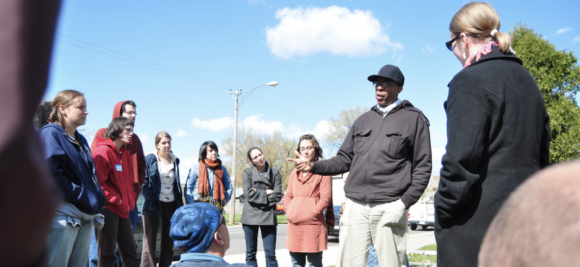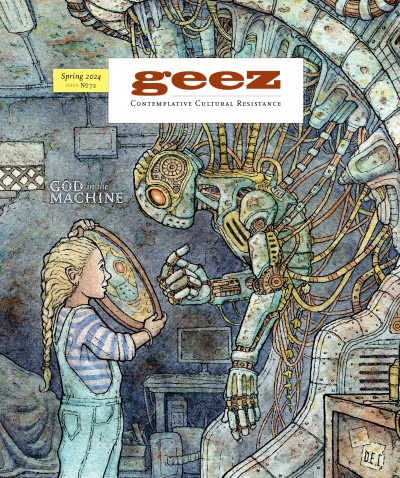The Stories from Which We Are Fed

Word & World Detroit Mentoring Program, 2010 by Tim Nafziger
Eds note: When Geez moved from Winnipeg to Detroit, we became part of the organization Word and World: A People’s School. The history of Word and World is now one stream that informs our work. This is a talk from Joyce Hollyday given at the Bartimaeus Kinsler Institute 2022 chronicling some of the history that is now a part of Geez.
A Glimpse at Word and World Schools, 2002 – 2015
We often referred to Word and World as a “moveable feast.” Believing that all theology rises out of the particulars of historical context, we showed up in places of transformative resistance and listened to the stories. And those stories moved and changed us.
Twenty years ago, at our first school, we heard the testimony of Pat Patterson. He was a student at North Carolina A&T University when four freshmen there refused to leave the Woolworth’s lunch counter in Greensboro on February 1st, 1960, sparking the sit-in movement. I still remember Pat describing himself as a teenager weighing the risks of participating—risks to his physical body as well as to his education and future. But his yes became clear. He told us, “God was whispering in my ear.” And I recall thinking, “I am witnessing history.”
History is alive in the stories of those who redirected it, in those with the vision to see a different world and the courage to pursue it. It also lives on in the places where transformation has occurred. And so our Word and World pedagogy was rooted in both incarnation and pilgrimage: hearing the stories of those in whom the Word was made flesh, and journeying to the sacred sites where the echoes of resistance still remain.
In Greensboro that included not only Woolworth’s, but also Morningside Homes, the site of the November 3rd, 1979 Greensboro Massacre. Joyce and Nelson Johnson lost five dear friends to Ku Klux Klan and American Nazi Party violence that day, and their stories and those of other survivors shaped our first school. At the gravesite of those who were killed, historian Vincent Harding led us in a prayerful ritual of remembrance.
Six months later, we were in Tucson, focusing on liberation theology and the struggle for justice in the borderlands. (This was back before we realized how complicated and exhausting this all was and we thought we could pull off two schools a year.) Osage theologian George Tinker enlightened us to traditions of Indigenous resistance to European colonization, and Dolores Huerta imparted rich firsthand history of the United Farmworkers Movement. Cami Juárez, a survivor of pesticide poisoning, shared his unforgettable story of determined advocacy for farmworkers.
At Southside Presbyterian Church, a centre of the 1980s sanctuary movement, John Fife spoke of the courage of refugees and their allies in the face of threats and arrests. Some of us ventured out into the desert: to share mass on the Tohono O’odham Reservation, to learn about the Cascabel community’s work for earth rights, or to visit one of the water stations set up by Humane Borders, which brought an unexpected opportunity to offer aid to immigrants who had just been robbed and abandoned by their coyote guide. Some of us went across the border into Nogales, Mexico, where, standing in their homes constructed from tarpaper and tires, we listened to the anguished stories of workers earning pennies a day in U.S.-based factories.
The Philadelphia school in 2003 focused on what Dr. Martin Luther King Jr. called “the giant triplets of racism, materialism, and militarism.” We celebrated Pentecost in Church of the Advocate, a hub of African-American struggle and triumph, and the place wherein 1974 the first women were “irregularly ordained” in the Episcopal Church. We heard from activists about the occupation of St. Edward’s Catholic Church by unhoused people in 1995. Liz McAlister and others shared about the first Plowshares action for disarmament at nearby King of Prussia in 1980. And at the waterfront, with the rusting hull of a luxury cruise ship named The United States of America as ironic backdrop, we heard stories of peacemakers in canoes blocking arms shipments during the Vietnam War.
In Rochester in 2004, we celebrated womanist, feminist, mujerista, and LGBTQ movements. We worshiped at Spiritus Christi, a Roman Catholic church excommunicated for ordaining a woman and for blessing gay unions. I still remember Mary Ramerman painting a mental picture for us of church hierarchs barging into the sanctuary like cops responding to a bomb threat, seeing her celebrating the mass and shouting, “Step away from the altar!” Kaye Fox shared the challenges and joys of her life as a transgender woman in ministry. Pilgrimages included the site of a vibrant matriarchal Iroquois society, and historic sites related to the suffrage and abolition movements.
We took the pedagogy of story to a different level with the 2005 school in Minneapolis, focused on the life of William Stringfellow: street lawyer, lay theologian, author, and connoisseur of the circus. We spoke of “biography as theology,” hearing from friends close to him and exploring his insights about the principalities and powers, which continue to shape radical discipleship in our current age of empire.
“Faith and Labor” was the focus of our 2006 Memphis school. There, as in Greensboro, I had a particularly acute sense of stepping into history. We walked through the Lorraine Motel where Dr. King was assassinated, now a Civil Rights museum. And we heard testimony from brave souls who were part of the sanitation workers’ strike that had brought him to their city.
Labour issues were also central in the Tarheel, NC, school in 2007. There, on a hot summer day, we held a protest vigil at Smithfield Packing, the world’s largest hog-slaughtering plant. Rev. William Barber led us in a rally and prayer service. Plant workers spoke of injuries and deaths caused by unsafe working conditions, heavy lifting, and fast, repetitive tasks. Former worker Elsa Garza related her heartbreaking story of losing her job when she needed to take time off to care for her sick daughter.
In Detroit in 2015, we added “soil” to Word & World’s focus on the intersection of “seminary, sanctuary, and streets,” with a school focused on land and water. We visited urban farms and learned about the land grab by banks and corporations that is destroying low-income neighbourhoods. We heard the tragic stories of a few of the thousands of Detroiters who have had their water shut off under the racist and illegal rule of an emergency manager. And we celebrated hip-hop and other creative Detroit cultural expressions.
It feels a little breathtaking now to consider all the extraordinary people we met and the breadth and depth of their stories, only a fraction of which there’s time to mention. Such an abundance of courage to shower us with hope! God has been whispering in a lot of ears—and probably shouting in a few.
During the early years of Word & World, I was part of an oral history project. My colleagues Milton Hurst, Susan Mitchell, and I travelled throughout the U.S. Southeast, collecting stories from elders who were part of the last generation to attend schools that were founded just after the Civil War, by and for people newly emancipated from enslavement.
One sweltering July day, as we were driving home through miles of cotton fields outside Tougaloo, Mississippi, Milton told us that, when she was young, his enslaved grandfather’s sister had tried to stop some white men from beating an enslaved man. They hung a millstone around her neck and drowned her in the Alabama River. For the next few hours, Milton shared with us the family legacy of tragedy and triumph that had shaped his eight decades of life and his powerful ministry.
He believed that one of our problems today is that we do not tell the stories of courage to younger generations. He said, “To relive history in the retelling of the story means that you’re informed about survival…It also gives more than a hint about those specific places where God has deliberately touched down and moved a church or a people.”
We inhabit an era in which strong forces are aligning to shut down the stories. Whether through banned books, trumped-up terror campaigns about Critical Race Theory, or relentless efforts to rewrite history, no effort is being spared to bury the truth. In such a time as this, the stories are more critical than ever. And I am grateful to be among people who know and embrace their power.


Start the Discussion